Educational Challenges Faced by International Students in UK Education
VerifiedAdded on 2023/01/12
|6
|1305
|68
Report
AI Summary
This report delves into the educational challenges encountered by international primary and secondary-level students, specifically focusing on students who have migrated from India to the UK. The main body of the report explores the concepts, debates, and theories surrounding these challenges, including racism, homesickness, language and cultural barriers, and curriculum differences. It examines the difficulties students face in adapting to the UK's education system and classroom environments, while also discussing the application of theories such as social capital theory, ecological system theory, and resilience theory to address these issues. The report emphasizes the importance of school policies and environments in supporting migrant students' integration and academic success, drawing on relevant research and literature. The report concludes by highlighting the importance of understanding and addressing these challenges to ensure positive educational outcomes for migrant students.
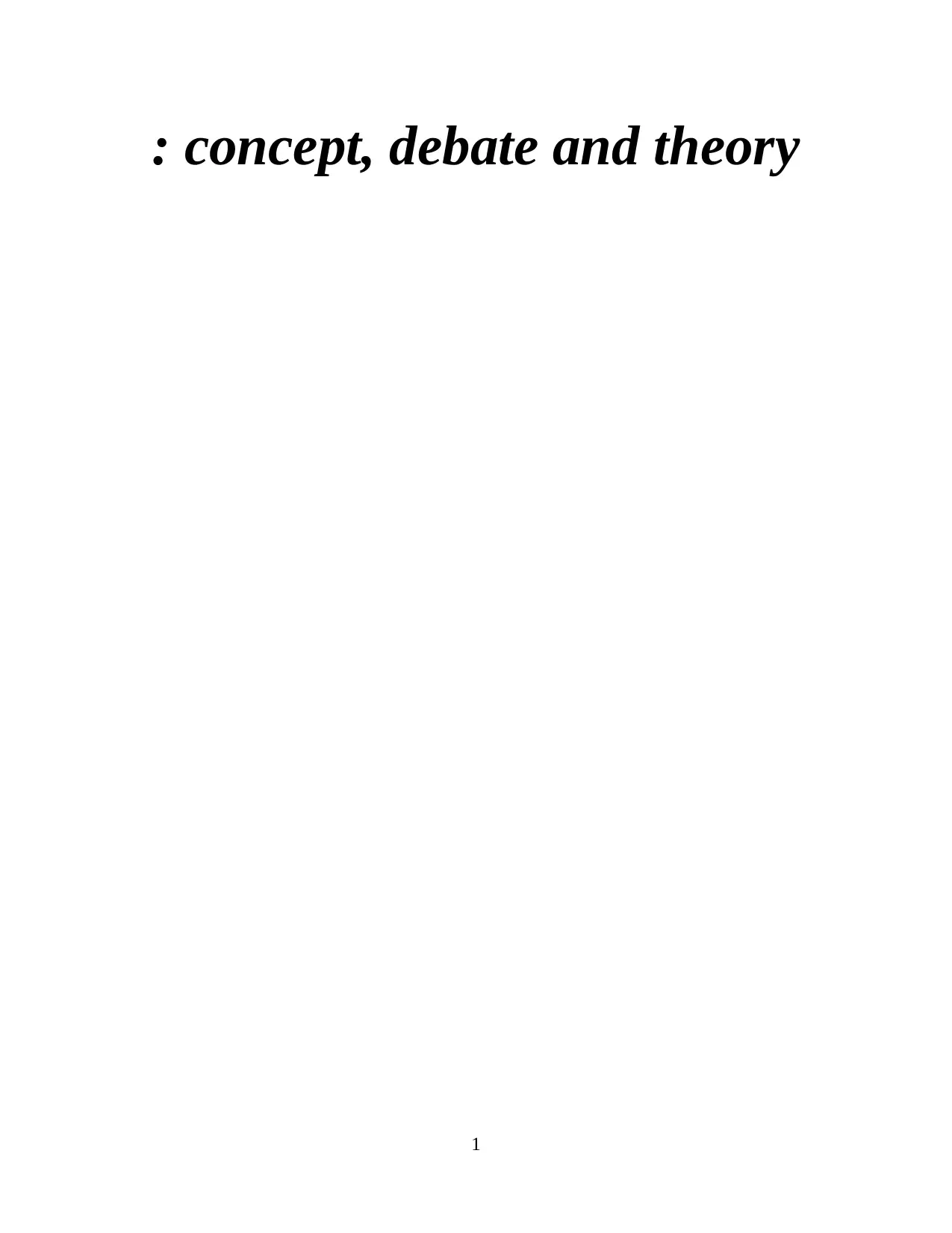
: concept, debate and theory
1
1
Paraphrase This Document
Need a fresh take? Get an instant paraphrase of this document with our AI Paraphraser
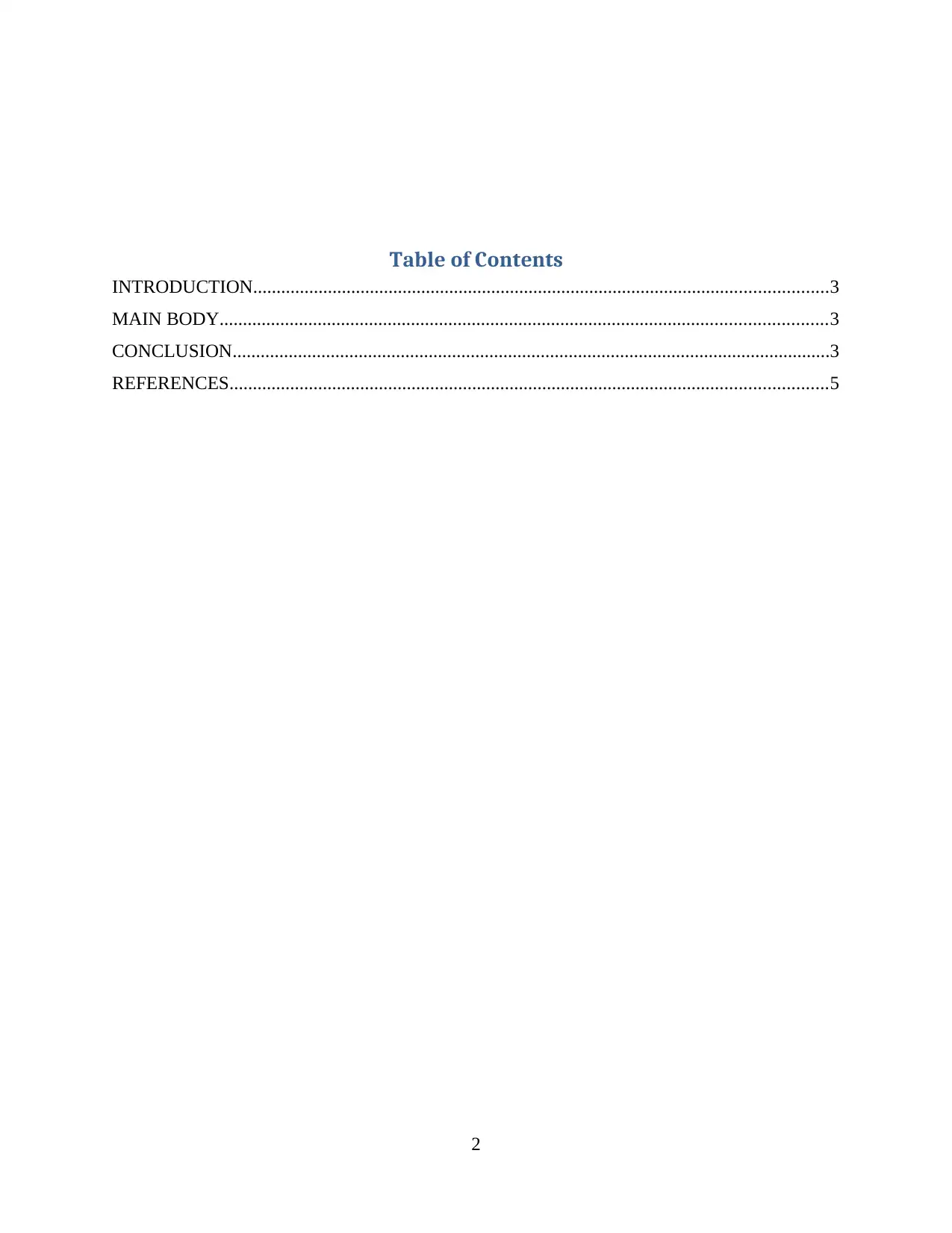
Table of Contents
INTRODUCTION...........................................................................................................................3
MAIN BODY..................................................................................................................................3
CONCLUSION................................................................................................................................3
REFERENCES................................................................................................................................5
2
INTRODUCTION...........................................................................................................................3
MAIN BODY..................................................................................................................................3
CONCLUSION................................................................................................................................3
REFERENCES................................................................................................................................5
2
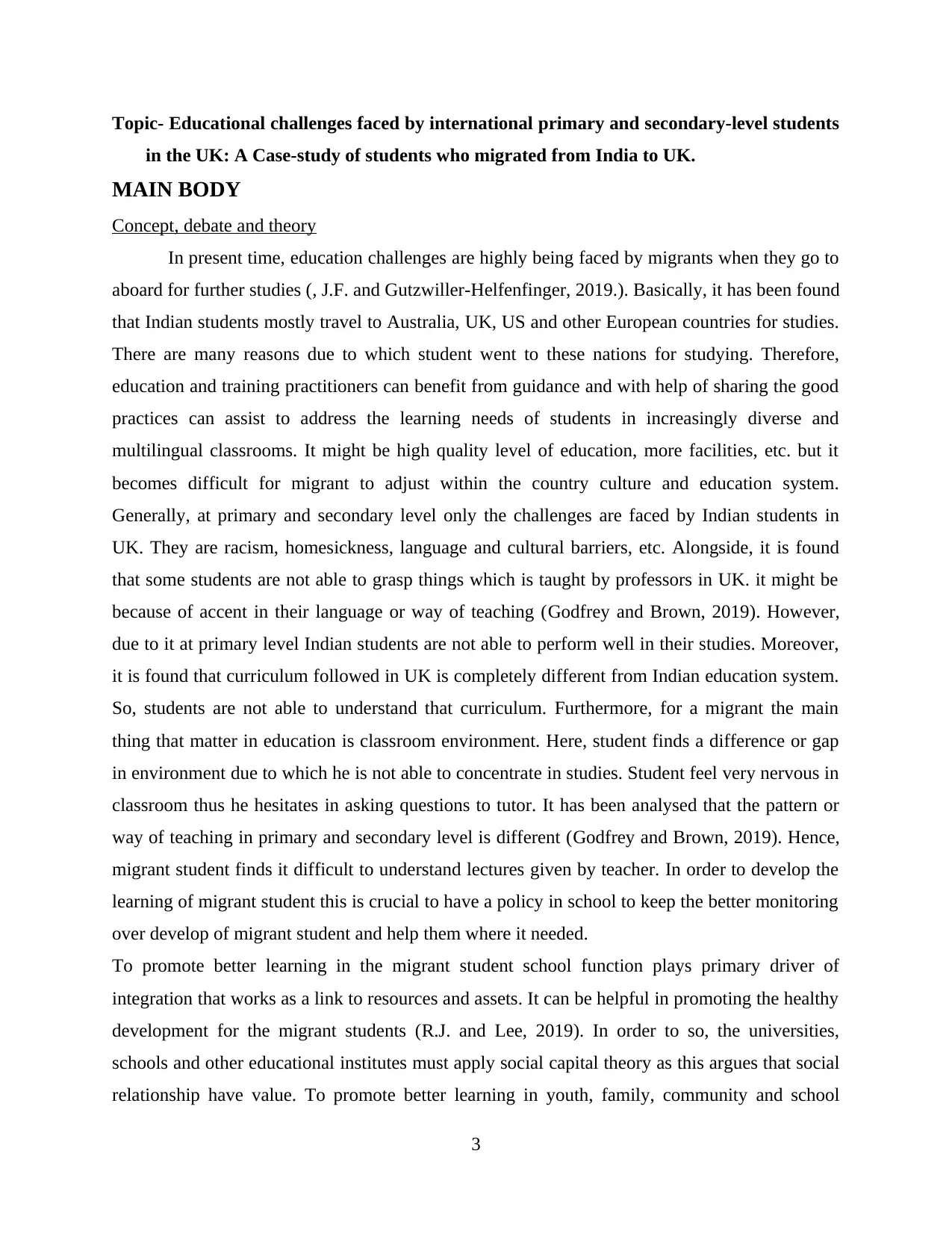
Topic- Educational challenges faced by international primary and secondary-level students
in the UK: A Case-study of students who migrated from India to UK.
MAIN BODY
Concept, debate and theory
In present time, education challenges are highly being faced by migrants when they go to
aboard for further studies (, J.F. and Gutzwiller-Helfenfinger, 2019.). Basically, it has been found
that Indian students mostly travel to Australia, UK, US and other European countries for studies.
There are many reasons due to which student went to these nations for studying. Therefore,
education and training practitioners can benefit from guidance and with help of sharing the good
practices can assist to address the learning needs of students in increasingly diverse and
multilingual classrooms. It might be high quality level of education, more facilities, etc. but it
becomes difficult for migrant to adjust within the country culture and education system.
Generally, at primary and secondary level only the challenges are faced by Indian students in
UK. They are racism, homesickness, language and cultural barriers, etc. Alongside, it is found
that some students are not able to grasp things which is taught by professors in UK. it might be
because of accent in their language or way of teaching (Godfrey and Brown, 2019). However,
due to it at primary level Indian students are not able to perform well in their studies. Moreover,
it is found that curriculum followed in UK is completely different from Indian education system.
So, students are not able to understand that curriculum. Furthermore, for a migrant the main
thing that matter in education is classroom environment. Here, student finds a difference or gap
in environment due to which he is not able to concentrate in studies. Student feel very nervous in
classroom thus he hesitates in asking questions to tutor. It has been analysed that the pattern or
way of teaching in primary and secondary level is different (Godfrey and Brown, 2019). Hence,
migrant student finds it difficult to understand lectures given by teacher. In order to develop the
learning of migrant student this is crucial to have a policy in school to keep the better monitoring
over develop of migrant student and help them where it needed.
To promote better learning in the migrant student school function plays primary driver of
integration that works as a link to resources and assets. It can be helpful in promoting the healthy
development for the migrant students (R.J. and Lee, 2019). In order to so, the universities,
schools and other educational institutes must apply social capital theory as this argues that social
relationship have value. To promote better learning in youth, family, community and school
3
in the UK: A Case-study of students who migrated from India to UK.
MAIN BODY
Concept, debate and theory
In present time, education challenges are highly being faced by migrants when they go to
aboard for further studies (, J.F. and Gutzwiller-Helfenfinger, 2019.). Basically, it has been found
that Indian students mostly travel to Australia, UK, US and other European countries for studies.
There are many reasons due to which student went to these nations for studying. Therefore,
education and training practitioners can benefit from guidance and with help of sharing the good
practices can assist to address the learning needs of students in increasingly diverse and
multilingual classrooms. It might be high quality level of education, more facilities, etc. but it
becomes difficult for migrant to adjust within the country culture and education system.
Generally, at primary and secondary level only the challenges are faced by Indian students in
UK. They are racism, homesickness, language and cultural barriers, etc. Alongside, it is found
that some students are not able to grasp things which is taught by professors in UK. it might be
because of accent in their language or way of teaching (Godfrey and Brown, 2019). However,
due to it at primary level Indian students are not able to perform well in their studies. Moreover,
it is found that curriculum followed in UK is completely different from Indian education system.
So, students are not able to understand that curriculum. Furthermore, for a migrant the main
thing that matter in education is classroom environment. Here, student finds a difference or gap
in environment due to which he is not able to concentrate in studies. Student feel very nervous in
classroom thus he hesitates in asking questions to tutor. It has been analysed that the pattern or
way of teaching in primary and secondary level is different (Godfrey and Brown, 2019). Hence,
migrant student finds it difficult to understand lectures given by teacher. In order to develop the
learning of migrant student this is crucial to have a policy in school to keep the better monitoring
over develop of migrant student and help them where it needed.
To promote better learning in the migrant student school function plays primary driver of
integration that works as a link to resources and assets. It can be helpful in promoting the healthy
development for the migrant students (R.J. and Lee, 2019). In order to so, the universities,
schools and other educational institutes must apply social capital theory as this argues that social
relationship have value. To promote better learning in youth, family, community and school
3
⊘ This is a preview!⊘
Do you want full access?
Subscribe today to unlock all pages.

Trusted by 1+ million students worldwide
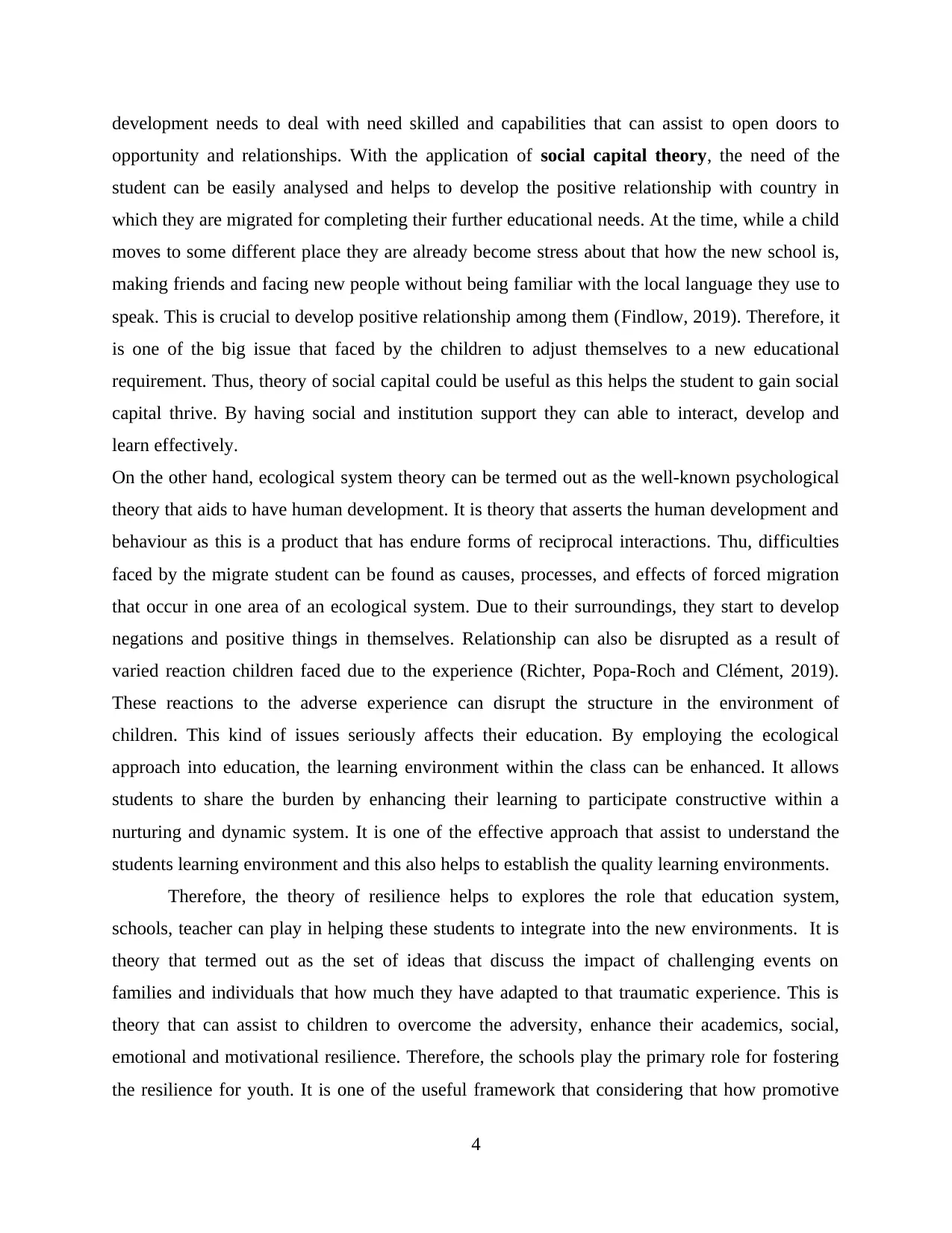
development needs to deal with need skilled and capabilities that can assist to open doors to
opportunity and relationships. With the application of social capital theory, the need of the
student can be easily analysed and helps to develop the positive relationship with country in
which they are migrated for completing their further educational needs. At the time, while a child
moves to some different place they are already become stress about that how the new school is,
making friends and facing new people without being familiar with the local language they use to
speak. This is crucial to develop positive relationship among them (Findlow, 2019). Therefore, it
is one of the big issue that faced by the children to adjust themselves to a new educational
requirement. Thus, theory of social capital could be useful as this helps the student to gain social
capital thrive. By having social and institution support they can able to interact, develop and
learn effectively.
On the other hand, ecological system theory can be termed out as the well-known psychological
theory that aids to have human development. It is theory that asserts the human development and
behaviour as this is a product that has endure forms of reciprocal interactions. Thu, difficulties
faced by the migrate student can be found as causes, processes, and effects of forced migration
that occur in one area of an ecological system. Due to their surroundings, they start to develop
negations and positive things in themselves. Relationship can also be disrupted as a result of
varied reaction children faced due to the experience (Richter, Popa-Roch and Clément, 2019).
These reactions to the adverse experience can disrupt the structure in the environment of
children. This kind of issues seriously affects their education. By employing the ecological
approach into education, the learning environment within the class can be enhanced. It allows
students to share the burden by enhancing their learning to participate constructive within a
nurturing and dynamic system. It is one of the effective approach that assist to understand the
students learning environment and this also helps to establish the quality learning environments.
Therefore, the theory of resilience helps to explores the role that education system,
schools, teacher can play in helping these students to integrate into the new environments. It is
theory that termed out as the set of ideas that discuss the impact of challenging events on
families and individuals that how much they have adapted to that traumatic experience. This is
theory that can assist to children to overcome the adversity, enhance their academics, social,
emotional and motivational resilience. Therefore, the schools play the primary role for fostering
the resilience for youth. It is one of the useful framework that considering that how promotive
4
opportunity and relationships. With the application of social capital theory, the need of the
student can be easily analysed and helps to develop the positive relationship with country in
which they are migrated for completing their further educational needs. At the time, while a child
moves to some different place they are already become stress about that how the new school is,
making friends and facing new people without being familiar with the local language they use to
speak. This is crucial to develop positive relationship among them (Findlow, 2019). Therefore, it
is one of the big issue that faced by the children to adjust themselves to a new educational
requirement. Thus, theory of social capital could be useful as this helps the student to gain social
capital thrive. By having social and institution support they can able to interact, develop and
learn effectively.
On the other hand, ecological system theory can be termed out as the well-known psychological
theory that aids to have human development. It is theory that asserts the human development and
behaviour as this is a product that has endure forms of reciprocal interactions. Thu, difficulties
faced by the migrate student can be found as causes, processes, and effects of forced migration
that occur in one area of an ecological system. Due to their surroundings, they start to develop
negations and positive things in themselves. Relationship can also be disrupted as a result of
varied reaction children faced due to the experience (Richter, Popa-Roch and Clément, 2019).
These reactions to the adverse experience can disrupt the structure in the environment of
children. This kind of issues seriously affects their education. By employing the ecological
approach into education, the learning environment within the class can be enhanced. It allows
students to share the burden by enhancing their learning to participate constructive within a
nurturing and dynamic system. It is one of the effective approach that assist to understand the
students learning environment and this also helps to establish the quality learning environments.
Therefore, the theory of resilience helps to explores the role that education system,
schools, teacher can play in helping these students to integrate into the new environments. It is
theory that termed out as the set of ideas that discuss the impact of challenging events on
families and individuals that how much they have adapted to that traumatic experience. This is
theory that can assist to children to overcome the adversity, enhance their academics, social,
emotional and motivational resilience. Therefore, the schools play the primary role for fostering
the resilience for youth. It is one of the useful framework that considering that how promotive
4
Paraphrase This Document
Need a fresh take? Get an instant paraphrase of this document with our AI Paraphraser
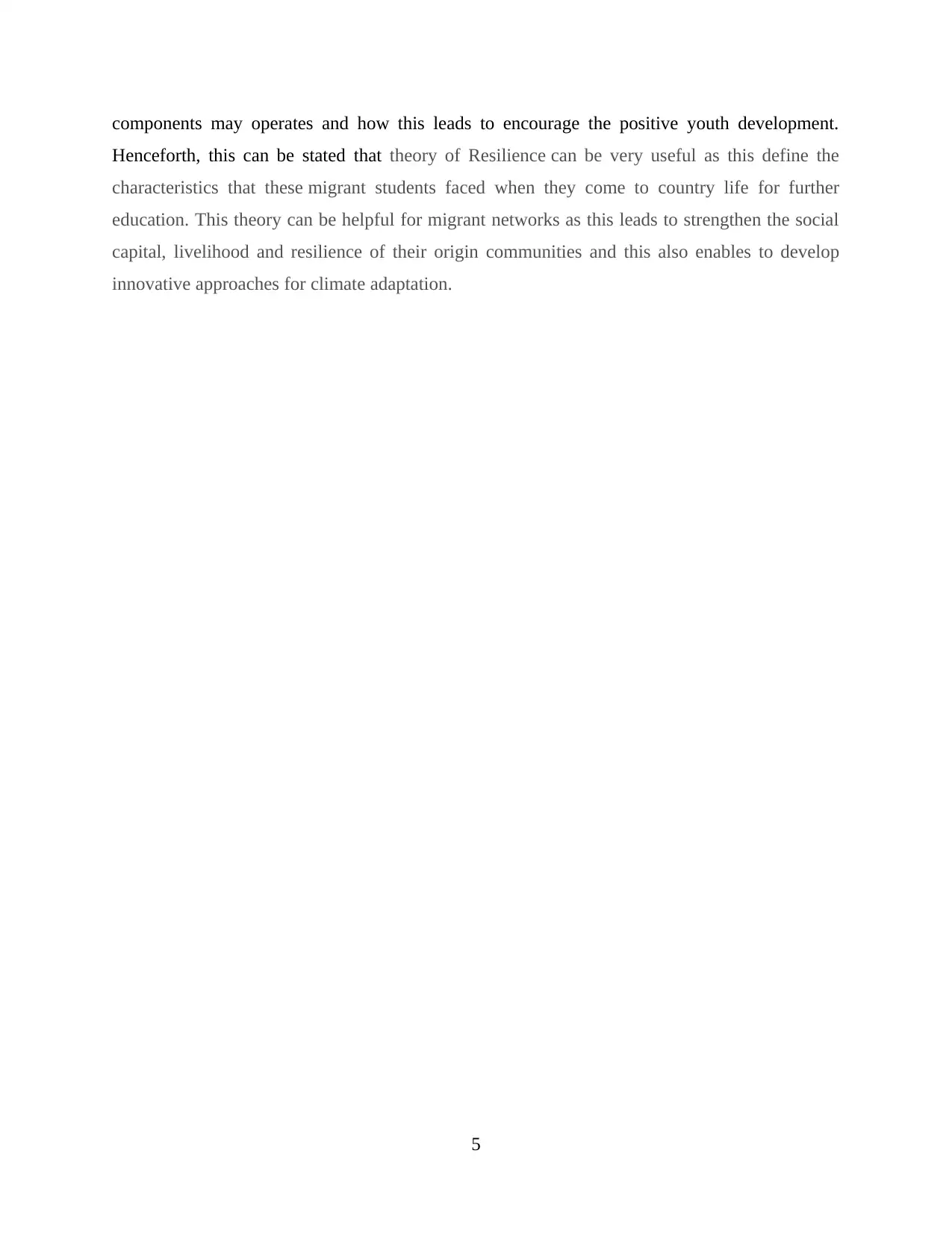
components may operates and how this leads to encourage the positive youth development.
Henceforth, this can be stated that theory of Resilience can be very useful as this define the
characteristics that these migrant students faced when they come to country life for further
education. This theory can be helpful for migrant networks as this leads to strengthen the social
capital, livelihood and resilience of their origin communities and this also enables to develop
innovative approaches for climate adaptation.
5
Henceforth, this can be stated that theory of Resilience can be very useful as this define the
characteristics that these migrant students faced when they come to country life for further
education. This theory can be helpful for migrant networks as this leads to strengthen the social
capital, livelihood and resilience of their origin communities and this also enables to develop
innovative approaches for climate adaptation.
5
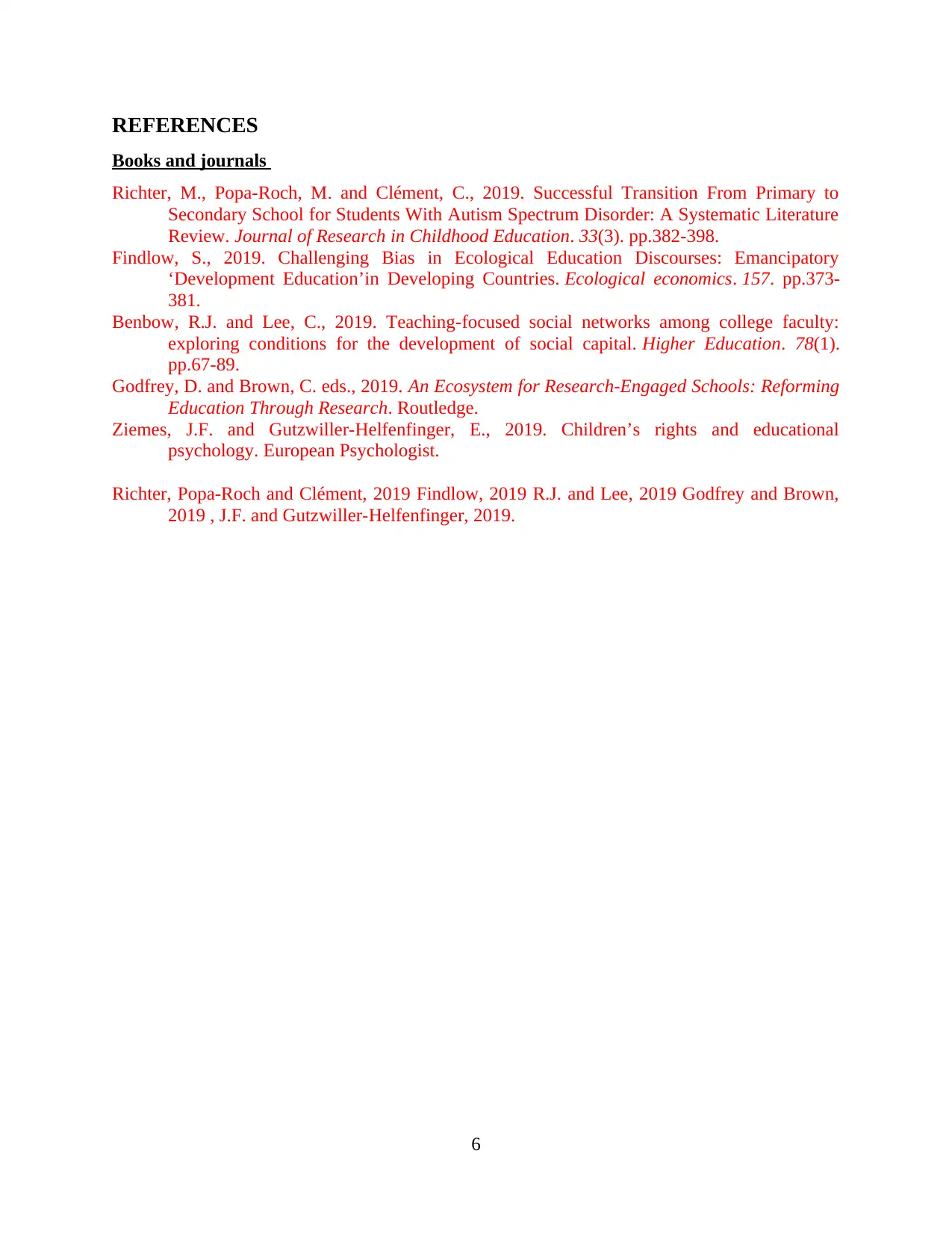
REFERENCES
Books and journals
Richter, M., Popa-Roch, M. and Clément, C., 2019. Successful Transition From Primary to
Secondary School for Students With Autism Spectrum Disorder: A Systematic Literature
Review. Journal of Research in Childhood Education. 33(3). pp.382-398.
Findlow, S., 2019. Challenging Bias in Ecological Education Discourses: Emancipatory
‘Development Education’in Developing Countries. Ecological economics. 157. pp.373-
381.
Benbow, R.J. and Lee, C., 2019. Teaching-focused social networks among college faculty:
exploring conditions for the development of social capital. Higher Education. 78(1).
pp.67-89.
Godfrey, D. and Brown, C. eds., 2019. An Ecosystem for Research-Engaged Schools: Reforming
Education Through Research. Routledge.
Ziemes, J.F. and Gutzwiller-Helfenfinger, E., 2019. Children’s rights and educational
psychology. European Psychologist.
Richter, Popa-Roch and Clément, 2019 Findlow, 2019 R.J. and Lee, 2019 Godfrey and Brown,
2019 , J.F. and Gutzwiller-Helfenfinger, 2019.
6
Books and journals
Richter, M., Popa-Roch, M. and Clément, C., 2019. Successful Transition From Primary to
Secondary School for Students With Autism Spectrum Disorder: A Systematic Literature
Review. Journal of Research in Childhood Education. 33(3). pp.382-398.
Findlow, S., 2019. Challenging Bias in Ecological Education Discourses: Emancipatory
‘Development Education’in Developing Countries. Ecological economics. 157. pp.373-
381.
Benbow, R.J. and Lee, C., 2019. Teaching-focused social networks among college faculty:
exploring conditions for the development of social capital. Higher Education. 78(1).
pp.67-89.
Godfrey, D. and Brown, C. eds., 2019. An Ecosystem for Research-Engaged Schools: Reforming
Education Through Research. Routledge.
Ziemes, J.F. and Gutzwiller-Helfenfinger, E., 2019. Children’s rights and educational
psychology. European Psychologist.
Richter, Popa-Roch and Clément, 2019 Findlow, 2019 R.J. and Lee, 2019 Godfrey and Brown,
2019 , J.F. and Gutzwiller-Helfenfinger, 2019.
6
⊘ This is a preview!⊘
Do you want full access?
Subscribe today to unlock all pages.

Trusted by 1+ million students worldwide
1 out of 6
Related Documents
Your All-in-One AI-Powered Toolkit for Academic Success.
+13062052269
info@desklib.com
Available 24*7 on WhatsApp / Email
![[object Object]](/_next/static/media/star-bottom.7253800d.svg)
Unlock your academic potential
Copyright © 2020–2026 A2Z Services. All Rights Reserved. Developed and managed by ZUCOL.





